Saturday, April 29, 2006
Neighborhood Folk

Some places I've been reading of late (in no particular order):
-Naija Jams is your spot for info on music in Nigeria, usually hip-hop related. If you didn't hear about it last year, read about the 50 Cent's run-in with local rap star Eedris at an airport, which casued 50 to end his tour prematurely.
-Africanhiphop.com remains the central and most vital source of information on hip-hop across the continent. This cat from Holland has been running the site for years now. He mainly does a lot of research and work with Tanzanian artists.
-Benn loxo du taccu is the best African mp3 blog I know of. Matt knows his stuff!
-Also, if you're a big dork like me and still hungry for more, check African-rap.com for the latest info on African hip-hop news and events in Europe.
For those with adventurous ears and fewer Afrocentric tendencies:
-Check Woebot for thoughtful articles on everything from rare-ass vinyl to French prog and other stuff you've probably never heard of (that's good).
-Funky 16 Corners is a way daunting collection of rare funk and soul 45s with comprehensive descriptions.
-Cocaine Blunts is downright vital for rap/hip-hop heads looking for mp3s and commentary on the rappers/producers you know and love and the underground artists you wish you knew about earlier.
I have been doing an mp3 blog of sorts myself called Awesome Tapes from Africa. You'll find the occasional hiplife cut there, along with a bunch of weird and/or amazing music I have come across. Tapes must never be forgotten.
Wednesday, April 19, 2006
Peace in Dagbon, Northern Ghana?
BBC report here describes the recent funeral for the murdered King of Dagbon. Four years ago he and twenty or so of his men were slain by the rival clan vying for the throne.
Tamale, the town I've been blogging about recently, is largest town in the Dagbon traditional area in the Northern Region. Although the actual capital of the kingdom is in Yendi, a several hours down the road, Tamale is largest Dagomba town.
This BBC article is a bit sensationalist at times. But useful in gaining a broader sense of the context in which some young musicians are making serious strides.
Just check out the last few posts for more on hiplife in Northern Ghana.
Tamale, the town I've been blogging about recently, is largest town in the Dagbon traditional area in the Northern Region. Although the actual capital of the kingdom is in Yendi, a several hours down the road, Tamale is largest Dagomba town.
This BBC article is a bit sensationalist at times. But useful in gaining a broader sense of the context in which some young musicians are making serious strides.
Just check out the last few posts for more on hiplife in Northern Ghana.
Monday, April 17, 2006
A Snapshot of Popular Music in Tamale
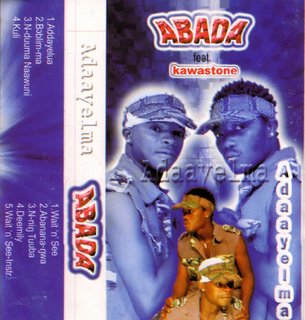
There are so many musicians doing creative things in Tamale, Northern Region, Ghana. I wanted mention just a couple of them. Hopefully, there be time in future to devote to talking about more of these singular local artists.
I met Abada when they played a VCD (yeah, that's right. that's what's often used in Ghana) release party for one young hiplife group called B.F.G.s. Their name, which stands for Big Friendly Guys, subverts the stereotypes amongst ordinary folks that hiplife dudes are trouble. This is the first Tamale hiplife artist to release a VCD, so this show was big. Abada were part of a line-up that included most of the top Tamale musicians of the last several years. The show and after-show lasted til late. At least 10 different groups and individuals performed a mix of hiplife, their local brand of highlife, and reggae. The parking lot outside was a sea of motorbikes and ice cream sellers and all sorts of local teens. Most people ended up at another place on the other side of town where there were DJs spinning the usual mix of r&b, hip-hop, dancehall, and local sounds.
Abada, interviewed at their hang-out. An area they call Yaari ghetto. Black Moon on the right, Black Shanty on the left
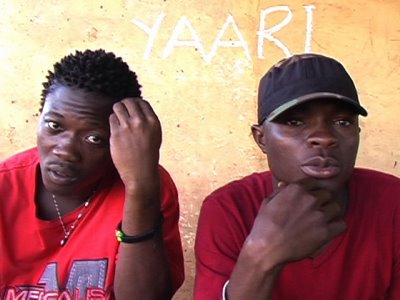
Here they are on stage at the release party the night before. This is at one of the main nightlife spots in town, Picorna.
Black Moon, the the sweeter, highlife-oriented half of the vocal duo.
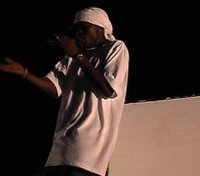
Black Shanty, the ragga boy with the rough and deep tones.

MC Rauf, aka Shoe Shine Boy, is one of the well-established veterans of the scene these days. I met him when I first came to Tamale in 2002 and we chatted at his barbershop. He was initially a shoe shine boy, he told me. To be a shoe shine boy is one of least desirable or profitable gigs in Ghana, but it also connotes a sort of dilligence, which Rauf seems to embody. Listen to one song, aptly titled "
I was lucky to come back to Tamale after about three years and kick it with Rauf again.
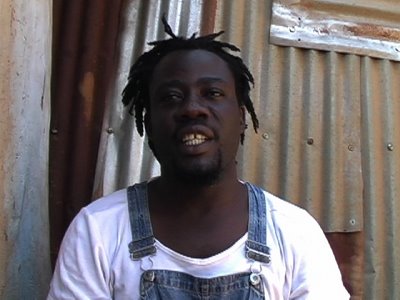
Sunday, April 09, 2006
Gyedu-Blay Ambolley and the Roots of Hiplife
One of the first questions I would ask anyone in Ghana that I interviewed was, "When did you first hear someone rap in a local language?" If I could take all the footage I shot and make one massive montage of people giving their three-word answer, it would last at least five minutes.
Gyedu Blay-Ambolley.
Reggie Rockstone is almost universally recognized as the first really rap in a clear adaptation of hip-hop aesthetics. He was the first to do something referred to by the indignenized moniker, hiplife. But, the first Ghanaian musician to "rap"-- to speak quickly using rhyme, metaphor, and other poetic and/or verbal devices-- was Gyedu-Blay Ambolley (according to the people with whom I spoke).
So, it follows that we check out what is arguably the first use of rap in Ghana on a record (that I know of at least). The song is called"Highlife". It's essentially Burger highlife (a sort of disco-infused higlife which emerged in the late-1970s), with its four-on-the-floor groove, synths, and English lyrics. This recording comes from the consistently impressive Cut Your Coat LP (1985).
This excellent site offers more info on Ambolley and Ambolley's own site is homebase proper for sure...enjoy.
I traded records with a guy in Accra, that's where I got this record. I gave him a stack of vinyl, which included Nas' Illmatic, The Listening by Little Brother, and the "Blue Flowers" 12", and he gave me this and a few other highlife, juju, and afro-beat LPs. His name is Nii and he's a really great guy. If you want to trade records/DJ equipment with a guy in Ghana, contact me and I'll link you up.
Gyedu Blay-Ambolley.
Reggie Rockstone is almost universally recognized as the first really rap in a clear adaptation of hip-hop aesthetics. He was the first to do something referred to by the indignenized moniker, hiplife. But, the first Ghanaian musician to "rap"-- to speak quickly using rhyme, metaphor, and other poetic and/or verbal devices-- was Gyedu-Blay Ambolley (according to the people with whom I spoke).
So, it follows that we check out what is arguably the first use of rap in Ghana on a record (that I know of at least). The song is called
This excellent site offers more info on Ambolley and Ambolley's own site is homebase proper for sure...enjoy.
I traded records with a guy in Accra, that's where I got this record. I gave him a stack of vinyl, which included Nas' Illmatic, The Listening by Little Brother, and the "Blue Flowers" 12", and he gave me this and a few other highlife, juju, and afro-beat LPs. His name is Nii and he's a really great guy. If you want to trade records/DJ equipment with a guy in Ghana, contact me and I'll link you up.
Thursday, April 06, 2006
Hip-Hop Is Big In Mali
A wall near the town football stadium, Mopti, Mali
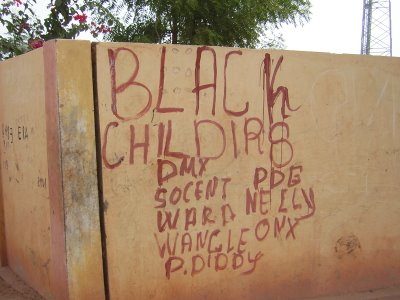
A wall on a building near the university, Timbuktu, Mali


A wall on a building near the university, Timbuktu, Mali

Tuesday, April 04, 2006
They Use Rap To Sell Alcohol in Africa Too
Most musicians in Ghana, even some of the most famous ones, don't make tons of money. They have to pay bills, so many appear in advertisements if they can.
Click here to see this commercial a seriously seminal rapper did with a local drink company. (Go to the Media Room and click on the third video)
This is not an isolated case. Another key forefather of the movement told me he made more money on a single ad contract with a major beer company than he did in his whole career in music. My previous post makes mention of hiplifers and adverts.
So, why not go for some real money in endorsements? Why not, when you're minor (in many cases) fiscal stake in your music prevents you from making the kind of cash you probably deserve?
Most hiplife artists sell the rights to their record outright to a producer in order to get it printed and onto the market. The artist gets a chunk of cash. But even if the song sells a lot, they don't see too much more money, unless they play lots of shows.
Click here to see this commercial a seriously seminal rapper did with a local drink company. (Go to the Media Room and click on the third video)
This is not an isolated case. Another key forefather of the movement told me he made more money on a single ad contract with a major beer company than he did in his whole career in music. My previous post makes mention of hiplifers and adverts.
So, why not go for some real money in endorsements? Why not, when you're minor (in many cases) fiscal stake in your music prevents you from making the kind of cash you probably deserve?
Most hiplife artists sell the rights to their record outright to a producer in order to get it printed and onto the market. The artist gets a chunk of cash. But even if the song sells a lot, they don't see too much more money, unless they play lots of shows.
Monday, April 03, 2006
GhanaConscience Breaks Down Sidney's "Obia Nye Obia"

Here you'll find a thorough article on Sidney's most recent status-quo-perturbing cut, "Obia Nye Obia." The article is written from the perspective of someone in Ghana, hearing all the back and forth of arguments for and against the song's message, a message that seems to have polarized folks.
It's business as usual for Sidney, whose earlier controversial work includes "Scenti No" and "Abuskeleke." The former is a metaphor-laden ode to the various smells found around Accra, some of which originate in the Parliament house and/or the MP's armpits. The latter talks of young girls and their bodies, which can be used by men to a point (for a price, of course) but are eventually theirs (and only theirs) take elsewhere. Abuskeleke is a commonly-used, though uncouth, slang term basically meaning slut, to simplify translation. Not sure which came first the song or the associated term.
Long story short, Sidney talks about issues that stir up public discussion. Read the above-linked article about his "Obia Nye Obia" and check out the vital lyricist that is Sidney the "Hiplife Ninja."
Check out GhanaConscience, which is part of GhanaThink.org. They have an enormous database of lyrics to Ghanaian songs, including lots of hiplife stuff. That's where I found this awesome article.
PS- I wish I had a photo of the huge billboards advertising Champion Condoms in Ghana. Sidney is on there endorsing this popular brand, lurking over bus stations and traffic circles around the country. They had radio commercials which Sidney raps on to the beat of "Scenti No," only this time he inserts "Champion Condoms" in there somewhere...
Sunday, April 02, 2006
Hammer Makes Serious Beats

This is Hammer. He is known for beats that, on the surface, borrow more from Western-style hip-hop than they do from Ghanaian dance rhythms and folk songs. But, if you listen closely, you can hear local sensibilities.He is conscious of Akan tradition rhythms such as Adowa when he composes his beats. This contrasts with J-Que’s (see previous post) sound in many ways, not least because J-Que’s jama is a Ga rhythm. Like Wulomei in the '70s, J-Que has sparked a Ga cultural revival through his consistent use of a rhythm they consider to be their own. Actually a number of other groups in Ghana lay claim to jama, but we won't get into that here.
Tympani, orchestra chimes, and minor keys feature strongly in Hammer's productions, while most beat programmers stick to your usual synthesized trumpet and organ timbres. Hammer acknowledges his penchant for a driving pulse that usually hangs somwhere around 112 BPM. This is faster than States-side hip-hop tends to be. Don’t forget, we’re still in Ghana, where music generally needs to be danceable if anyone’s going to buy it or spin it.
With a sound that has influenced a significant number of beat programmers in Ghana, Hammer still somehow feels like a cult phenonmenon almost. Since he refuses to work with artists who can't rap hard over a beat or freestyle acapella, he is not quite as prolific as some of the other top engineers in Accra. You don't hear his beats for five songs in a row on the radio (this can happen with a couple other engineers/producers). His work is instantly recognizable and the rappers who bless his tracks are some of the most hardcore in Ghana, though not necessarily the most rich and famous.
Hammer works almost exclusively with local-language rappers. Known for his work initially with Twi rapper Obrafuor, and later with Tinny, Hammer encourages virtuosic skills. He is credited with pushing Tinny, one of Ghana's biggest rappers, to begin rapping in what was then considered an unconventional language, Ga. Tinny's Ga rhymes blow people away with their clever twists and pointed remarks. Ga is the language spoken by the original inhabits of what is now Accra, Ghana's capital. But, the vast majority of Ghanaians cannot understand speak Ga, even many of those who live in Accra. Only now, with the popularity of Tinny, and more recently, Castro, I found people rocking Ga hiplife songs all over Ghana, even in the Twi stronghold of Kumasi and all the way in the Upper East Region. Ga language has gained a sort of hip cachet amongst young people in the smaller urban centers of Ghana, being that it has become associated with big city life and several huge hiplife songs whose lyrics reflect fast and fun times. This all comes (indirectly) thanks to the support and collaboration of Hammer.
Ground breaking work with Obrafuor, along with a series of compilations, have laid the foundations for a counter-movement of hiplife artists who don't care much for the bubblegum arrangements and lovey-dovey lyrics found in many mainstream jams. Rather, Hammer and his camp of young rappers bring the only hint of locally produced edginess that can be found on most local radio stations. Nevertheless, innumerable English-language emcees sporting hard beats and conscious rhymes continue to languish in almost complete obscurity...
Nurturing underground rappers is the new trend among the hiplifers who have already reached a certain level of success in the industry. Hammer oringinated this trned with his series of Compilations, which drawn on the talent of underground cats who've made their way into Hammer's camp. It is though these comps that underground rappers likeKwaw Kesse and Okra Tom became well-known over the last couple years.
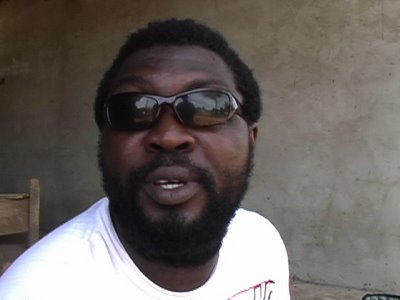
Hammer was one of the first people I contacted when I reached Ghana, and he became a sort of touchstone for me throughout my year of research. He was the first person to invite me to Hush Hush to observe a recording session. Hammer also introduced me to a number of players in the industry. Much respect to Hammer, a very humble, down-to-earth, and talented individual.